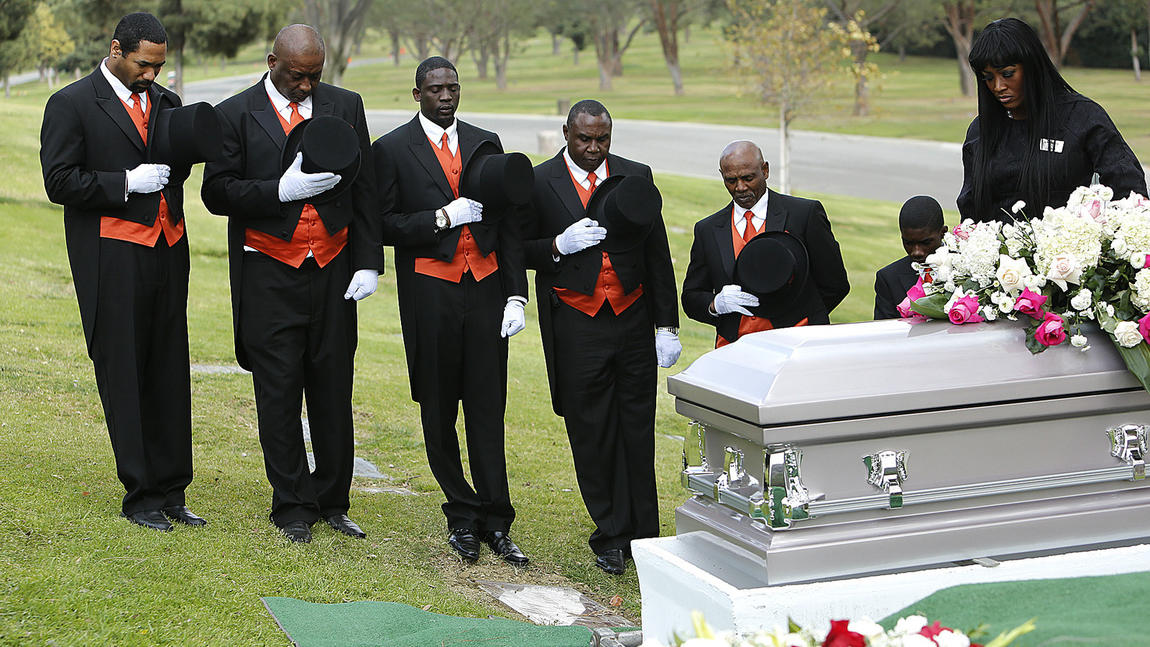Professional Pallbearers Have an Uplifting Touch
In the stucco church on South Vermont, the five rows of pews are packed. Kids wedge between parents. Space meant for one holds three. Church hats and suits mingle with T-shirts and jeans.
A woman has died — a wife, mother, grandmother. The program fills a page. Long-lost cousins clutch each other and cry. Fresh air seems to diminish in supply. Hungry eyes track the few foil-covered casseroles making their way to the kitchen.
In the midst of it all appear eight immaculately dressed figures. The mourners’ heads turn. They nudge others to look.
One is a teenager. The rest are men. They wear black top hats and tails and burnt-orange ties and vests. Their backs are straight. On their hands are white gloves.
In a slow, swinging dance synchronized to gospel music, they strut as they carry the casket shoulder-high down the center of the room. Then in rotating pairs they stand guard beside it, one at each end, throughout songs, sermons, viewing.
An hour in, the pair up front remain still, eyes fixed forward. The senior pastor sternly scans the sanctuary, then rests his gaze on them.
“When you all want to know how real men dress, how real men conduct themselves in an orderly fashion…. This is how you act! At attention!” he thunders.
“Ladies,” he adds, “don’t they look good?”
The men work for Boyd Funeral Home, just north of the church in this Westmont neighborhood, where the median household income is just over $31,500 and the homicide rate is one of the highest in Los Angeles County.
Where there is need, there is business, so some call this stretch of the avenue Funeral Home Row. Candy Boyd, who runs the business started in 1963, knows the importance of finding ways to stand out.
At many African American funerals, death is spoken of as “homegoing.” The crush of grief combines with celebration of that reunion with God.
This year, Boyd had her funeral home’s Cadillac hearse outfitted with exterior speakers to start what she calls the “celebration of life” early by blasting gospel music en route to services. She also introduced the professional pallbearers, free with any funeral package.
As they leave each church, the men lift the casket and dance it out, smiling and high-stepping to joyful songs.
“Oh happy day. Oh happy day, when Jesus washed, Oh when he washed, When Jesus washed my sins away.”
The pomp offers relief. It also offers respect. To the dead. To their families. To any life lived, however meager. And not least, to the pallbearers themselves.
Joe Jackson showed up at the funeral home when he was 13 years old. Boyd set him to work sweeping the small chapel.
Ever since he was small, Joe has wanted to be a funeral director — at first because of the fancy cars. When he was 5, a neighbor was scared to go into the bedroom when her husband failed to get up as usual. Joe wasn’t. He is untroubled by death.
“He’d passed in his sleep, so it was peaceful,” he said.
Joe has written his own obituary. He’s chosen his casket — blue on the inside, white with gold handles on the outside. He’s set up a Facebook page for his future mortuary business, although he’s just 16 and in high school. Handsome and dapper, he was a natural for Boyd’s pallbearer troupe, the perfect crowd charmer and flower bearer.
As for the rest of the crew, she had no idea where she would find them.
Then Arthur Yarbrough came looking for a job: embalming, makeup, hair, whatever — he said he’d done it all back home in Atlanta. One day last fall, he had climbed onto a Greyhound bus heading west. By the time he reached L.A., he had $17 in his pocket. Right away, the 45-year-old found himself on skid row, sleeping at the Los Angeles Mission.
Read full article from LA Times




